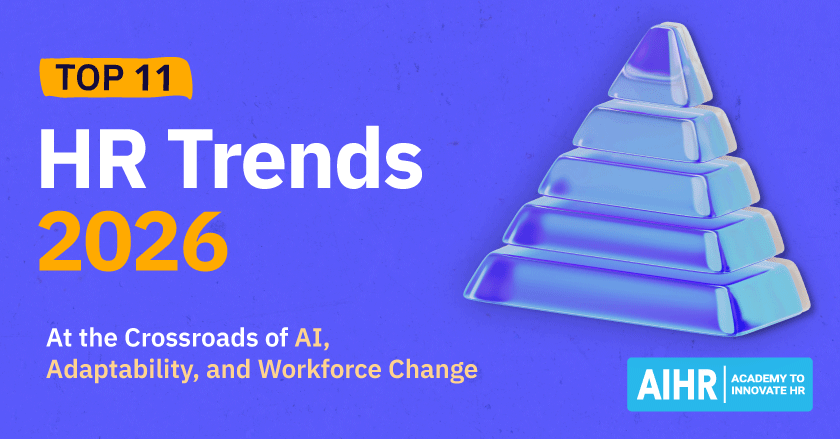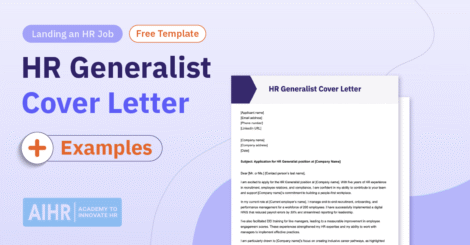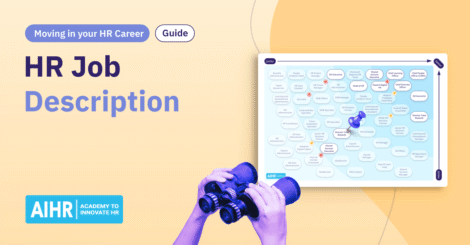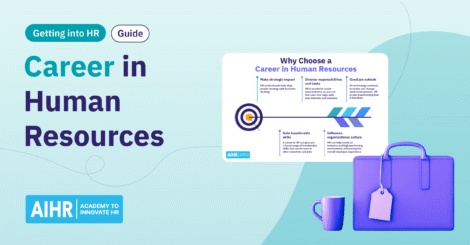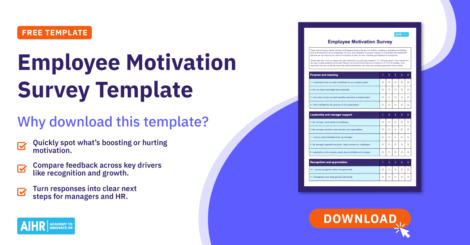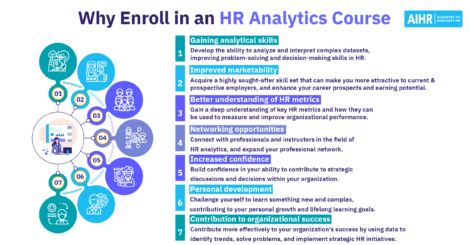The HR officer is an entry to middle-level HR generalist responsible for a broad range of duties, or a specialist focusing on one area of HR. They hire, train, and support an organization’s most important asset, namely its people, to further the organization’s culture and mission.
Contents
Role family, salary range & work experience
Key responsibilities
Skills & competencies
Job description template: Head of HR
Detailed responsibilities & tasks
KPIs for this role
Training programs
Role family, salary range & work experience
- HR Role family: Solution architect
- Salary range: $59,000 – 72,000
- Work experience: 4-7 years
Key responsibilities
- Guides business stakeholders to align and deliver HR activities and processes
- Actively participates in the recruitment and retention of employees to ensure the organization has the talent it needs to thrive
- Maintain workplace standards and looks after the health, safety, and satisfaction of employees at work
Skills & competencies
- Analytics
- Translation
- Business Advisory/Partnering/Generalist
- Engages People
- HR Operations and Administration
- Interprets context
- Understands Customers
Job description template: Industrial Relations Specialist
Responsibilities:
Job Title: HR Officer
Location: [Insert location]
Reports to: [Insert name and title of supervisor]
The HR Officer is responsible for providing support and guidance to management and employees on a variety of HR-related matters.
The primary duties of an HR Officer may include:
Responsibilities:
- Assisting with the recruitment process, including posting job openings, screening resumes, and scheduling interviews.
- Coordinating new employee orientation and onboarding, including conducting orientation sessions and facilitating new hire paperwork.
- Providing guidance and support to managers and employees on HR policies, procedures, and best practices.
- Managing employee records and ensuring compliance with record-keeping requirements.
- Managing employee benefits programs, including enrollment, changes, and questions.
- Managing employee relations, including conducting investigations and recommending corrective action.
- Managing performance management processes, including developing performance improvement plans and conducting performance evaluations.
- Managing HR-related projects, including conducting research and analyzing data.
- Assisting with payroll processing and ensuring compliance with payroll laws and regulations.
- Developing and delivering HR-related training programs to employees and managers.
Requirements:
- Bachelor’s degree in Human Resources, Business Administration or related field.
- Minimum of 2 years of experience in human resources.
- Strong knowledge of HR laws and regulations.
- Excellent communication and interpersonal skills.
- Strong organizational and project management skills.
- Proficiency in Microsoft Office and HRIS software.
- Ability to maintain confidentiality and handle sensitive information.
- Strong problem-solving and decision-making skills.
Detailed responsibilities & tasks
- Assisting with the recruitment process, including posting job openings, screening resumes, and scheduling interviews.
- Coordinating new employee orientation and onboarding, including conducting orientation sessions and facilitating new hire paperwork.
- Providing guidance and support to managers and employees on HR policies, procedures, and best practices.
- Managing employee records and ensuring compliance with record-keeping requirements.
- Managing employee benefits programs, including enrollment, changes, and questions.
- Managing employee relations, including conducting investigations and recommending corrective action.
- Managing performance management processes, including developing performance improvement plans and conducting performance evaluations.
- Managing HR-related projects, including conducting research and analyzing data.
- Assisting with payroll processing and ensuring compliance with payroll laws and regulations.
- Developing and delivering HR-related training programs to employees and managers
Detailed skills description
- Communication skills: HR Officers need to have strong communication skills, both verbal and written. They need to be able to communicate effectively with employees, managers, and other stakeholders to ensure that HR policies and procedures are understood and followed.
- Organizational skills: HR Officers need to be highly organized and able to manage multiple tasks and deadlines simultaneously. They need to be able to prioritize tasks and manage their time effectively.
- Interpersonal skills: HR Officers need to have strong interpersonal skills and be able to build relationships with employees, managers, and other stakeholders. They need to be approachable, empathetic, and able to handle difficult situations with tact and diplomacy.
- Attention to detail: HR Officers need to have excellent attention to detail, as they are responsible for maintaining accurate employee records and ensuring compliance with HR laws and regulations.
- Problem-solving skills: HR Officers need to be able to identify and solve problems related to HR policies and procedures. They need to be able to think critically and creatively to develop effective solutions.
- Analytical skills: HR Officers need to be able to analyze data and make data-driven decisions. They need to be able to use HR metrics and analytics to identify trends and areas for improvement.
- Knowledge of HR laws and regulations: HR Officers need to have a strong understanding of HR laws and regulations, such as employment law, payroll laws, and health and safety regulations.
KPIs for this role
- Recruitment metrics, such as time-to-fill and cost-per-hire, to measure the efficiency and effectiveness of the recruitment process.
- Employee turnover rate, to measure the success of employee retention efforts and identify areas for improvement.
- Employee engagement and satisfaction surveys, to assess employee satisfaction with HR policies and programs and identify areas for improvement.
- Compliance with HR laws and regulations, such as maintaining accurate employee records and ensuring compliance with payroll laws.
- Training metrics, such as the number of employees trained and the effectiveness of training programs, to measure the impact of HR-related training programs.
- Performance management metrics, such as the number of performance evaluations completed and the percentage of employees meeting performance goals, to measure the success of performance management processes.
- HR-related project completion and success rates, to measure the success of HR-related projects and initiatives.
- Customer service metrics, such as response time and satisfaction ratings, to measure the quality of HR support and service to employees and managers
Training programs
- HR Manager Certificate Program
- People Analytics Certificate Program
- Organizational Development Certificate Program


